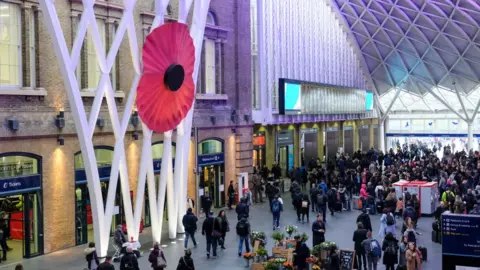Rail strike date moved over London Poppy Day clash
 Future Publishing/Getty
Future Publishing/GettyA strike by Network Rail workers has been re-arranged to avoid a clash with the Royal British Legion's London Poppy Day appeal.
The Rail, Maritime and Transport union (RMT) said its Network Rail members would strike on 5, 7 and 9 November.
The union said having been made aware of the poppy appeal on 3 November, planned strike action that day had been moved to the 9th.
The appeal aims to raise £1m in a day and up to 2,000 volunteers fundraise.
The RMT said it would continue its industrial campaign until it reached a negotiated settlement on job security, pay and working conditions.
Last week, Network Rail said it had a two year, 8% pay increase deal "on the table ready to be put to our staff".
Network Rail chief negotiator Tim Shoveller said: "Unfortunately, the leadership of the RMT seem intent on more damaging strikes rather than giving their members a vote on our offer."
In separate disputes, London Underground and Overground (Arriva Rail London) workers who are RMT union members will strike on 10 November, which had also been planned for 3 November.
 John Keeble/Getty
John Keeble/GettyRMT general secretary Mick Lynch said: "Our focus in this dispute is the rail employers who have yet to make an offer that will create the conditions for a negotiated settlement.
"I call upon the new Prime Minister Rishi Sunak to unshackle the rail industry so they can come to a settlement with RMT.
"We will vigorously pursue our industrial campaign until we achieve a deal."

Analysis by Katy Austin, BBC Transport Correspondent
Strikes will still take place, and there will still be extensive disruption for passengers.
It's just that some will be on different dates.
The RMT won't hold any strikes on the 3rd, and the TSSA is expected to call off its action that day too.
RMT members at 14 train companies will now only take part on 5 November.
But walkouts at Network Rail on 5, 7 and 9 mean it's likely only about 20% of Britain's usual train services will be able to run on those days.
September's train strikes were cancelled out of respect, following the Queen's death.
But apart from that, this is the first time in this wave of industrial action that dates have been changed after being announced.
For example, the biggest strike to date, the day before the London marathon in October, went ahead despite causing problems for many runners who'd planned to head to the capital that day.

The date change comes after the legion had to cancel its planned fundraiser due to fear of "one of the most important days in our annual remembrance calendar being a waste of time."
Commenting on the rearrangement, The Royal British Legion, said: "We are very grateful to the RMT union for cancelling its strike action on 3 November.
"We recognise and respect the right of all unions to take action for their members, and it was unfortunate on this occasion it would have had such a serious impact on our fundraising."
There have been a series of rail strikes in the UK over the past months, as unions have clashed with Network Rail, which maintains and operates the infrastructure, train firms and the government, over pay and conditions.
